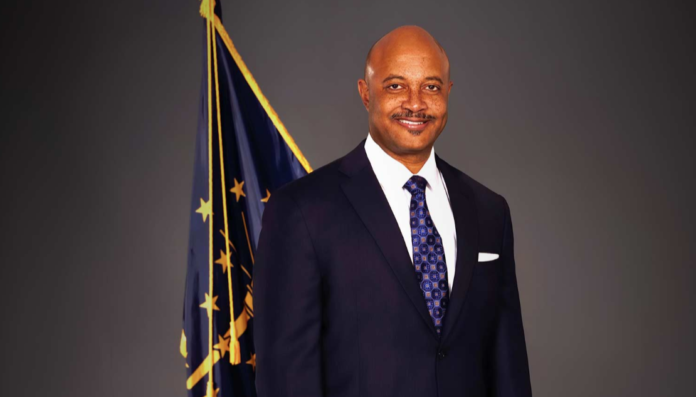Attorney General Curtis Hill released an op-ed piece about CBD oil and its status under Indiana law, Tuesday.
The Attorney General’s op-ed is below.
Last month Hill released an advisory opinion that said substances containing cannabidiol, or CBD, were illegal to possess, make and sell in Indiana under both state and federal law.
RELATED: AG: pot-derived oil illegal, except for epilepsy use
Indiana Gov. Eric Holcomb has also directed state excise police to check stores for the oils. This after Hill declared them illegal.
—
Shedding light on CBD oil under Indiana law
By Attorney General Curtis Hill
On Nov. 21, the Office of Attorney General released an official opinion affirming that CBD oil is illegal in Indiana.
For those just joining the discussion, CBD oil is a marijuana-derived substance taken orally or applied topically by people who believe it helps alleviate symptoms of certain ailments – or, in some cases, administered to children by caregivers.
Reaction to our opinion reveals the persistence of certain misperceptions.
A few points of clarification are in order.
First, the Indiana General Assembly makes laws in Indiana. The Office of Attorney General has no such authority.
On occasion, when questions arise, the Attorney General provides legal opinions on proper interpretation of Indiana statutes. This is precisely what transpired regarding the laws pertaining to CBD oil. No merit, then, should be attached to suggestions that CBD oil now is illegal in Indiana because the Attorney General has declared it to be so.
Interpreting a statute is not — nor should it be — an exercise in giving people what they want to hear. Neither should an Attorney General craft an interpretation simply designed to bolster his or her own personal viewpoints or agenda. These official opinions are intended to be clear-eyed and honest legal assessments of the laws as they are written.
Secondly, as we have stated: There is no doubt, as a matter of legal interpretation, that products or substances containing cannabidiol remain unlawful in Indiana as well as under federal law.
Thirdly, no one disputes the fact that CBD oil lacks any significant amount of THC, the substance in marijuana that causes people to “get high.” All agree that no one uses CBD oil to achieve such an effect. If anyone tried it for that purpose, they would be sorely disappointed.
Under existing laws, however, the amount of THC in CBD oil — even if it contains none at all — is not the determinant of its legal status. Rather, the determinant is whether a substance is produced from the floral bracts, resin and leaves of the Cannabis plant – and scientific literature confirms that cannabidiol cannot be distilled in sufficient amounts from inert parts of the plant such as the sterilized seeds or mature stalks.
Cannabidiol is classified under state and federal law as a Schedule I controlled substance because marijuana (Cannabis sativa) is a Schedule I controlled substance.
Many people might believe this standard to be illogical. Many people might believe THC content ought to be the standard by which a product’s legality is determined. Nevertheless, the current law states what it states — and simply ignoring existing law is ill-advised.
Obviously, anyone – including the Legislature and other elected officials — is free to advocate for laws more to their liking.
Fourth, there’s no question certain aspects of current law need work – such as the limited and focused exception created by House Enrolled Act 1148, signed earlier this year, which creates the Indiana State Department of Health’s Cannabidiol Registry for individuals battling treatment-resistant epilepsy. Currently, there appears to be no legally prescribed way under existing legislation for these individuals to purchase CBD oil.
I hope reiterating these points about the law and the function of the Office of Attorney General proves helpful.
As for my personal views, I have long opposed legalizing marijuana, which, to put it bluntly, makes people do stupid things. By contrast, CBD oil itself produces no similar impairment – and I hope it ultimately delivers on the promise its advocates say it holds out to people suffering from physical maladies.
Regarding the development of medicine, we should follow the standard scientific protocols developed in the United States for approving products as effective and safe. This means respecting the guidance of the Food and Drug Administration. Two products containing cannabidiol are currently undergoing clinical trials – Epidiolex and Sativex.
We all pray for breakthroughs that help treat disease, illness and injury. With regard to marijuana, we all hope for FDA-approved medicines that utilize whatever legitimate benefits this plant might offer civilization. Such a process is different from simply labeling dope as “medicinal” in order to assuage our collective conscience.
In the search for common ground, we all should share a common purpose to support scientific research and to enact sensible laws.





